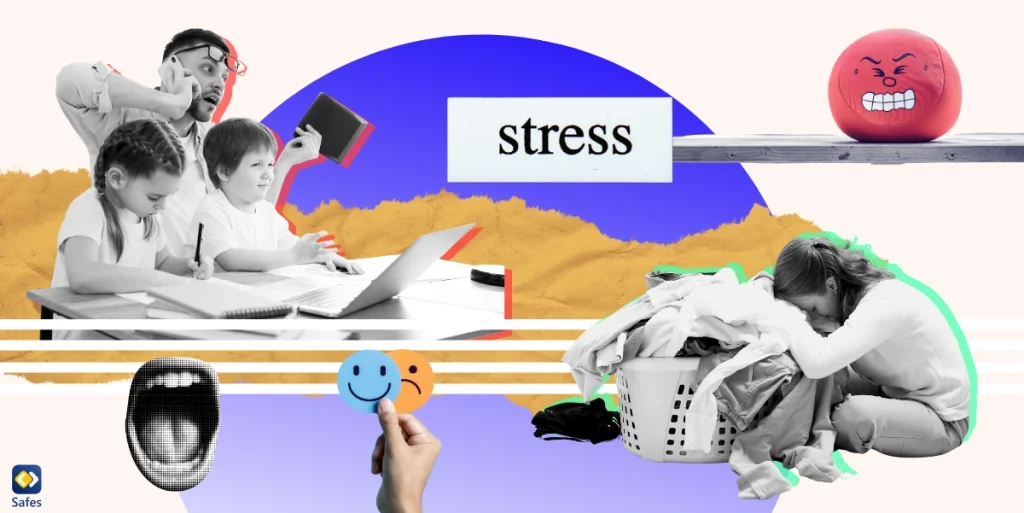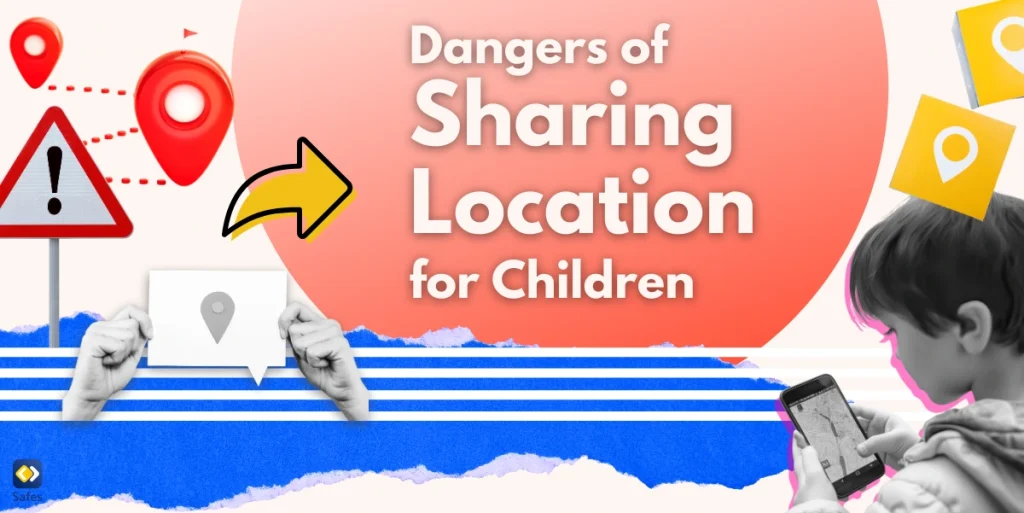The demands of parenting, especially in a hyperconnected world, can be incredibly taxing, leaving many parents feeling overwhelmed, stressed, and burned out. Whether you are a single parent or part of a parenting duo, the experience can sometimes feel akin to scaling a mountain. In fact, countless parents worldwide grapple with the same feelings of stress and overwhelm. This article aims to provide actionable strategies for managing the pressures of parenting for overwhelmed parents.
Download and Start Your Free Trial of the Safes Parental Control App
What Does It Mean When You Feel Overwhelmed with the Demands of Parenting?
Feeling overwhelmed as a parent could translate into a sense of being perpetually swamped, stressed, or anxious about your parenting duties. This sense of overwhelm often stems from the multifaceted nature of parenting, which requires you to juggle numerous tasks simultaneously.
If you are an overwhelmed parent, you may feel incapable of coping with everything, from your child’s physical and emotional needs to handling logistics related to school activities, health check-ups, and more. The feeling can be exacerbated by a lack of adequate support, financial strain, or additional work and home responsibilities.
What Are the Different Types of Overwhelm in Parenting and What Causes It?
Parenting overwhelm can take various forms, each stemming from different sources. Here are a few types:
Emotional Overwhelm: This arises when parents feel stretched thin emotionally, typically brought on by the emotional demands of parenting and managing their children’s emotions.
Physical Overwhelm: This is often a result of the physical demands of parenting, such as lack of sleep due to caring for a newborn or following a toddler around who won’t listen.
Mental Overwhelm: This involves mental exhaustion caused by the constant decision-making, problem-solving, and multitasking required in parenting.
Financial Overwhelm: The financial responsibilities of raising a child can lead to stress and overwhelm, especially for single parents or families facing economic hardships.

Recognizing Signs of Burnout in an Overwhelmed Parent
Recognizing the signs of burnout is crucial in preventing it from escalating. Burnout can manifest as:
- Constant fatigue and exhaustion, despite adequate sleep
- Frequent irritability or mood swings
- Feelings of detachment or disconnection from your child
- Decreased enjoyment or satisfaction in parenting
- Persistent feelings of inadequacy as a parent
- Physical symptoms such as headaches, stomach aches, or sleep disturbances
What Are the Consequences of Parenting Burnout?
Unchecked parental burnout can have significant physical and mental health repercussions. These can include depression, anxiety, insomnia, and increased susceptibility to physical illnesses due to a weakened immune system. Furthermore, burnout can lead to strained relationships within the family and impact children’s emotional and social development.
Moïra Mikolajczak, Ph.D. et al. have conducted a study on the consequences of parental burnout, which was published in the Journal of Child Abuse & Neglect. This study explores the relationship between parental burnout and its negative implications for parents, couples, and children. It found that burnout increases escapism and suicidal ideation, child neglect, and violence, highlighting the need for preventive measures. Dr. Mikolajczak’s study also suggests that interventions targeting worry and threat monitoring could reduce anxiety and distress in parents. We will discuss some of these interventions in this article.
Parents and Schools: How Can Parenting Stress Overwhelm Teachers?
Sometimes, overwhelmed parents may unknowingly transfer their stress to their children’s teachers. Parent diplomacy overwhelming teachers can occur when parents expect teachers to manage not just their child’s education but also their social skills development and emotional well-being. Such expectations can lead to increased stress for teachers and impact their ability to effectively perform their primary role—educating students.
Tips and Strategies to Stop Feeling Overwhelmed as a Parent
Here are some actionable tips to manage and mitigate feelings of overwhelm:
Practice Self-Care: Make time for activities that nourish your physical, mental, and emotional well-being. This could include exercise, meditation, pursuing a hobby, or simply taking a quiet moment for yourself each day.
Ask for Help: Don’t hesitate to lean on your support network when you need it. This could be your spouse, family members, friends, or a professional counselor.
Set Boundaries: Learn to say “no” to non-essential tasks or responsibilities that contribute to your sense of overwhelm.
Delegate Responsibilities: Share parenting responsibilities with your spouse or a trusted family member. If finances permit, consider hiring help for tasks like cleaning or babysitting.
Employ Stress Management Techniques: Techniques such as deep breathing, yoga, or mindfulness can help manage stress levels and promote relaxation.
Prioritize and Plan: Not everything needs to be done at once. Prioritize tasks and create a realistic plan to manage them without overwhelming yourself.
Stay Connected: Maintain strong relationships with your friends and other parents. They can provide emotional support, practical advice, and a much-needed sense of community.
Use Parental Control Apps: To help manage the digital dimension of parenting, consider using tools like the Safes parental control app. Safes can ease the burden of monitoring and controlling your child’s digital activities, making this aspect of parenting more manageable. It features geofencing and location tracking features, allowing you to monitor your child’s whereabouts, enhancing their safety in the physical world too.
Feel free to start your Safes free trial. You can download Safes from major app distribution platforms like Google Play and App Store.
Also, we’ve compiled a comprehensive guide on setting up default parental controls across various devices. Whether you’re using Android, iPhone, Mac, or Windows, our step-by-step resources will empower you to create a safer digital environment for your family. Click on the links below to access tailored instructions for each device:
- Windows parental controls
- Macbook parental controls
- Android parental controls
- iPhone parental controls
Feeling overwhelmed with parenting responsibilities? Sign up for a free trial with Safes to access tools and resources that can help you manage stress and create a balanced family life.

Special Tips for Overwhelmed Single Parents
Single parenting comes with its unique challenges and pressures. If you’re a single parent feeling overwhelmed, take heart. Here are some special tips catering to your needs:
Reach Out to Support Groups: Joining a support group for single parents can provide a safe space to share experiences, seek advice, and find solace in knowing you’re not alone.
Seek Professional Help: If feelings of overwhelm persist, consider reaching out to a mental health professional. They can provide valuable tools and strategies to manage stress and anxiety.
Build a Reliable Network: Create a support network of trusted family and friends who can lend a helping hand when needed.
Take Time for Yourself: While your children are your top priority, it’s essential to carve out time for self-care and relaxation. Remember, you can’t pour from an empty cup.
Who Are More at Risk of Burnout: Mothers or Fathers?
The risk of parental burnout is not gender-specific. Both mothers and fathers can experience feelings of being overwhelmed or burned out. However, societal norms and expectations can sometimes place a disproportionate burden on mothers, especially those juggling work and family responsibilities. Similarly, single parents, regardless of gender, may face a higher risk of burnout due to the added pressures of managing all parenting responsibilities solo.
Overwhelmed Mothers’ Depression
Overwhelmed mothers may experience a form of depression often referred to as maternal depression, which can manifest as postpartum depression or a more chronic depressive condition. It’s important to differentiate between the normal stress and fatigue of motherhood and a more serious depressive disorder that requires professional intervention.

Causes of Overwhelmed Mothers’ Depression
Hormonal Changes: After childbirth, rapid hormonal fluctuations can contribute to feelings of depression and anxiety.
Sleep Deprivation: Caring for a newborn often leads to a significant reduction in the amount and quality of sleep, which can exacerbate or trigger depression.
Lifestyle Changes: The transition to motherhood involves major life adjustments, including changes in work, social life, and personal identity, which can feel overwhelming.
Lack of Support: Feeling isolated or having a lack of support from partners, family, or friends can increase stress and contribute to depression.
Pre-existing Mental Health Issues: Women who have a history of depression or other mental health disorders are at a higher risk of developing depression during motherhood.
Socioeconomic Stress: Financial strain, job insecurity, or lack of access to healthcare can compound the stress of motherhood and lead to depression.
Expectations vs. Reality: The difference between societal expectations or personal ideals of motherhood and reality can lead to feelings of inadequacy and depression.
Complications During Pregnancy or Birth: Difficult pregnancies or childbirth experiences can also trigger emotional distress and depression.
Symptoms of Overwhelmed Mothers’ Depression:
- Persistent sadness, anxiety, or “empty” mood
- Loss of interest or pleasure in activities, including sex
- Feelings of irritability, frustration, or restlessness
- Feelings of guilt, worthlessness, or helplessness
- Changes in appetite or weight
- Sleep disturbances (sleeping too much or too little)
- Physical symptoms such as headaches, stomachaches, or muscle pain
- Difficulty concentrating, remembering, or making decisions
- Fatigue or loss of energy
- Thoughts of death or suicide, or suicide attempts
Interventions and Support
Seek Professional Help: Consult with a healthcare provider or a mental health professional to discuss symptoms and treatment options.
Medication: Antidepressants may be prescribed to help manage the chemical imbalances that contribute to depression.
Therapy: Counseling or therapy, such as cognitive-behavioral therapy (CBT), can provide emotional support and coping strategies.
Support Groups: Joining a support group for new mothers can provide a sense of community and shared understanding.
Self-Care: Prioritizing self-care, including regular exercise, a healthy diet, and adequate sleep, can help improve mental health.
Social Support: Enlisting the help of family, friends, or a partner can alleviate some of the burdens and provide emotional support.
Education: Learning about the signs and symptoms of depression can help mothers and their families recognize the issue and seek help sooner.
Wrap-Up: Prevent Becoming an Overwhelmed Parent
Preventing parental overwhelm starts with acknowledging its existence and understanding its potential impacts on your well-being and your family. By implementing stress management strategies, seeking help when needed, and practicing regular self-care, you can navigate the rewarding yet challenging journey of parenting with greater ease and less stress.
Being an overwhelmed parent is not a sign of failure, but a common experience shared by many. With the right tools and coping strategies, you can navigate the demands of parenting more effectively and turn the overwhelm into manageable, everyday challenges. Remember, you are not alone, and support is always available.
Your Child’s Online Safety Starts Here
Every parent today needs a solution to manage screen time and keep their child safe online.
Without the right tools, digital risks and excessive screen time can impact children's well-being. Safes helps parents set healthy boundaries, monitor activity, and protect kids from online dangers—all with an easy-to-use app.
Take control of your child’s digital world. Learn more about Safes or download the app to start your free trial today!




